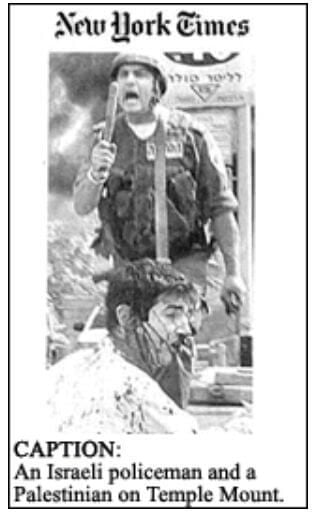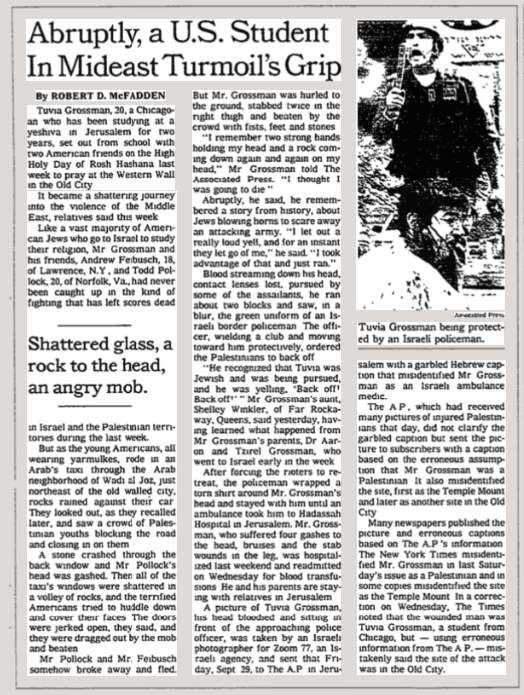The seeds of HonestReporting were planted at the very outbreak of the Second Intifada – on September 29, 2000. That’s when American student Tuvia Grossman was nearly lynched in Jerusalem, and saved by a baton-wielding Israeli policeman who fended off the ferocious Palestinian mob.
Soon the entire world – readers of the New York Times and hundreds of other papers from Los Angeles to Baltimore, Paris to Melbourne – saw the photo of a bloodied Tuvia, with the caption referring to him as “a Palestinian being beaten by the Israeli policeman.”

This was an inversion of reality. Why did the “mainstream media” automatically assume that the victim was Palestinian and Israel was the aggressor? Is it because Israel has more tanks and planes?
From my home in central Israel, I had been looking forward to a relaxing High Holiday season with my family. But all that changed when I saw the Times photo caption, and my investigative instincts kicked in.
I tracked Tuvia down the next day. He was badly bruised and shaken – with a broken nose, multiple gashes to his head, and a severely wounded leg that would require reconstructive surgery, months in a wheelchair, and physical therapy. Yet Tuvia was feeling doubly-victimized – not only a victim of the media war, but also used to gain international sympathy for Palestinians. That, Tuvia told me, hurt even more.
I wrote an article explaining the truth behind Tuvia’s story, which received widespread distribution. More importantly, it led to the Times publishing a rare admission of guilt: a 700-word article with a reprint of the original photo – this time with the proper caption, telling the full story of Tuvia’s near-lynching at the hands of a Palestinian mob.

Yet in the court of public opinion, the damage had already been done. From those first moments of the Intifada, the media was framing this as a battle between the so-called “Israeli aggressors and Palestinian victims.”
I immediately organized an email response team, and a group of friends in London did the same. It was very ad-hoc, with no budget, loose organizational structure, and little more than an intuitive sense that we were on the right track. When spotting a piece of biased news, we’d send an email alert to the entire list (these were the days before social media), who would in turn complain directly to the media outlet involved.
Because I had 20 years of professional marketing and journalism experience – and a journalism degree from the University of Texas – I was tapped to lead the newly-formed HonestReporting.
The idea grew like wildfire. People were furious and needed to vent. Thousands signed up to receive our critiques. This was grassroots activism at its best.
Yet although we had strong brigades of approximately 10,000 subscribers, to have a bigger impact, we needed an army of activists.
I decided to focus on a particular sore point in media coverage: Their refusal to refer to Palestinian suicide bombers as “terrorists” – claiming that “One man’s terrorist is another man’s freedom fighter.”
I launched an online petition, calling on the media to label Palestinian suicide bombers as “terrorists.” Within a few weeks, the petition had collected 100,000 signatures – which also included a subscription to HonestReporting. This boosted our subscriber numbers tenfold almost overnight. HonestReporting was on the map.
Our next strategic impact was to pressure CNN, at that time the cable news leader. I sent out email alerts – week after week – detailing CNN’s latest transgressions. HonestReporting subscribers in turn bombarded CNN with emails, creating a tidal wave of protest.
For a time, CNN may have been able to dismiss us as pesky media activists with an Internet line, but they could not ignore the financial bottom line. Websites sprang up with names like CNN-Watch, and a bumper sticker – “CNN Lies” – became popular on America’s roads. With an earthquake of bad energy directed at CNN, their reputation as “the most trusted name in news” was crumbling.
In the face of this public relations meltdown, top CNN officials flew to Israel, where they made the rounds to apologize, admitting that CNN had made “inexcusable mistakes” by presenting “incorrect perceptions” of the Arab-Israeli conflict.
For HonestReporting, apologies were not enough. A mechanism had to be put in place to ensure this bias did not recur. That’s when CNN agreed to assign a senior executive as my private liaison. This executive told me up front: “If you have a problem, come to me directly. Assuming that it’s reasonable, we’ll cooperate and make the appropriate changes. But please – stop sending alerts to your email list!”
CNN also agreed to address specific core issues, like ceasing to sympathize with terrorists and avoiding any impression of moral equivalence between terror victims and their attackers. Wolf Blitzer then flew to Israel to file a series of special reports on Israeli victims of terror, and CNN.com launched a special online section devoted to Israeli victims – including personal biographies, descriptions of the attacks, and interviews with victims’ families.
CNN’s concessions marked a huge triumph. Day after day, month after month, HonestReporting had been chiseling away – another critique and another email alert – and finally the dam burst.
The story was so big that The New York Times devoted a 1,300-word news article to the shift at CNN – citing HonestReporting for contributing to the change.
In the end, it was the public groundswell that pushed CNN over the edge. The Jerusalem Post reported that readers of HonestReporting communiqués sent thousands of e-mails a day to CNN executives, “effectively paralyzing their internal e-mail system.”
Most significantly, news outlets worldwide feared they could be our next target. As one foreign correspondent told me: “Many journalists were operating under a sense of unbridled affinity for the Palestinians. Those days are now over.”
In one corner of the world, sanity was restored. Justice had prevailed.
Shraga Simmons was the co-founder of HonestReporting, and is the author of “David & Goliath”, the definitive account of anti-Israel media bias. Originally from Buffalo, New York, he holds a degree in journalism from the University of Texas at Austin, and rabbinic ordination from the Chief Rabbi of Jerusalem. He lives with his family in the Modi’in region of Israel.
Liked this article? Follow HonestReporting on Twitter, Facebook, Instagram and TikTok to see even more posts and videos debunking news bias and smears, as well as other content explaining what’s really going on in Israel and the region. Get updates direct to your phone. Join our WhatsApp and Telegram channels!

